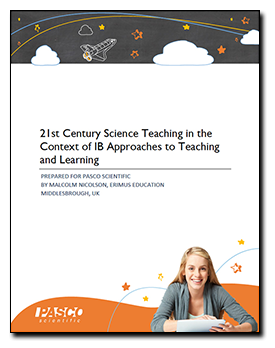
International Baccalaureate (IB): Inquiry-based Learning in Science
21st Century Science Teaching in the Context of IB Approaches to Teaching and Learning
Inquiry is a central idea in IB approaches to teaching. Learning through inquiry involves building on students’ prior knowledge, with a reduced emphasis on the teacher being the transmitter of knowledge. By engaging in effective inquiry, students develop skills in research, self-management, collaborative learning, communication, and thinking, as well as problem solving.
The IB curriculum supports using datalogging equipment since it has many benefits in accurately and efficiently collecting large data sets over periods of time.
PASCO’s wireless sensors have made data acquisition even more accessible by reducing costs and working seamlessly with any modern device. In the era of BYOD, a student’s computer, phone or tablet can serve as the datalogger, and data can be collected anytime and anywhere.
In today’s classrooms, not having sensors is like not having microscopes 50 years ago: there are still ways to address the content but students’ learning experience is highly compromised.
Scientific inquiry that uses appropriate technology gives students experience using the tools and practices of science, which prepares them to take their sciences beyond school.
For more information on how PASCO builds scientific understanding through technology–supported inquiry, click here to receive the complete white paper.
Be sure to check out Pages 16 & 17 for a complete list of the PASCO lab activities sensors that support the science practicals.
Abstract
This paper addresses how PASCO Scientific products and services support teaching and learning in IB programmes. Based on expert opinion, IB teacher interviews, and historical background, it uses IB guidance and curriculum materials to evaluate the IB approaches to teaching, pedagogy, and learning. This evaluation is used to the identify and demonstrate the support PASCO provides with science education solutions for MYP and DP programmes.
Introduction
The aim of this white paper is to communicate the clear synergy between International Baccalaureate (IB) programmes and PASCO products and services. This synergy is a result of a shared fundamental belief in inquiry-based teaching and learning, and in providing education that is active, contextual, and engaging.
When students take part in an authentic science experience using the technology and tools that scientists use, they understand the thrill of discovery and are better prepared for science literacy. A scientifically literate society is critical for nations to compete in a global marketplace and is an economic driver that enhances the lives of all citizens.
Education leaders around the world seek to transform their science programmes to support the growth of a knowledge-based economy, and PASCO is there to help. Developing students’ scientific literacy is a key step toward raising the standard of living, which prepares students to compete on a global scale. When students learn how to do science, and not just memorize facts, they develop competencies that help prepare them for job opportunities and the challenges that face all nations.
Countries around the world are racing to modernize their nations and prepare their people to compete on a global level. The key to their success lies in creating generations of educated citizens and skilled workers to drive economic development. It is through scientific literacy and with strong information, communication, and technology (ICT) skills that students can unlock opportunities on a global level.
